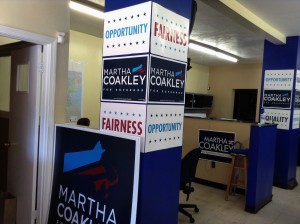It’s a clear Sunday afternoon in Dorchester. The Martha Coakley for Governor campaign office is bedecked with encouraging signs. One volunteer walks in carrying a packet, announcing that he has just knocked on 78 doors. The rest of the volunteers are still out doing just that, hoping to sway prospective voters and raise some last-minute funds for the campaign.

By the end of Tuesday’s primary, the Coakley campaign had nearly 3,000 volunteers who knocked on over 100,000 doors and made over 550,000 calls to voters, said Bonnie McGilpin, press secretary for Coakley’s campaign.
But it is not always the number of knocks or phone calls that has had the largest outcome in elections. Funds and fundraising are an important part of the campaign process.
After the polls closed Tuesday evening, it was Coakley who emerged victorious over Massachusetts Treasurer Steven Grossman and former Medicare administrator Don Berwick in the Democratic gubernatorial primary. This can be partially attributed to the fundraising mechanisms each candidate used for their respective campaigns.
In a University of Massachusetts Lowell/7News poll released Sept. 2, Martha Coakley was in the lead with 52 percent of likely Democratic primary voters, followed by Steven Grossman with 20 percent and Don Berwick with 9 percent.
The Berwick campaign relied heavily on grassroots campaigning for fundraising, said Leigh Appleby, press secretary at Don Berwick’s campaign.
“The way we’ve done our fundraising has been through grassroots,” he said. “These people who are supporters of Don are asking their friends and neighbors to become supporters of Don. The grassroots approach has been a very effective one.”
In the weekend prior to the election, 2,000 individuals volunteered their time to the Berwick campaign with the targeted goal of knocking on 80,000 doors and making 2,000 phone calls, Appleby said.
Only a month ago, Berwick had the lead in fundraising. Berwick raised $97,000 from Aug. 1 to 15, compared to $83,000 raised by Grossman and $69,000 raised by Coakley over that same period, according to the Massachusetts Office of Campaign and Political Finance.
Berwick’s focus on grassroots funding led him to rely less on super PACs than his running mates.
Super PACs, which are independent expenditure-only committees, raise money to advocate for or against candidates. But unlike political action committees, super PACs have no monetary limit on donations.
Super PACs have proven to be an effective, if not controversial, mechanism for campaign finance. In the gubernatorial race, they have accounted for more than 40 percent of total campaign spending over the past two months.
Grossman received a boost from super PACs, notably Mass Forward, which has contributed more than $475,000 to his campaign. The money from Mass Forward was used to launch an ad titled “Mothers” on July 28 aimed at Coakley’s stance on gun control.
Shortly after the ad was released, a Massachusetts law was passed that requires state super PACs to disclose top donors for TV spots. This led to the discovery that Grossman’s mother, Shirley Grossman, was among the Mass Forward donors, contributing $100,000 to the super PAC.
Grassroots fundraising is tied to super PAC advertisements in the Grossman campaign, said Josh Wolf, campaign manager of Grossman’s campaign.
“One beneficial tool for this has been [contribution site] ActBlue, which makes it easy for grassroots supporters to chip in small amounts whenever they’re inclined,” he said. “When they hear exciting campaign updates, such as the release of our recent ad, it gives everyone an opportunity to chip in multiple times during the campaign. We’re using our resources to communicate with voters in a wide range of capacities – at their doors, on the phones and through TV advertisements.”
The Coakley campaign criticized Grossman for his reliance on super PACs. McGilpin said the lack of transparency loses voters.
“Massachusetts voters have already made it clear that super PACs have no place in our elections. We believe that voters are most impacted by the one-on-one conversations about the issues that are impacting Massachusetts families, not super PAC ads,” she said. “We are pleased that the Legislature and Governor Patrick acted quickly to bring more transparency and accountability to super PACs in Massachusetts election.
“However, the only way to keep super PACs out of the race for governor is for Coakley’s opponents to join her in signing a People’s Pledge. Coakley was the first attorney general to support a constitutional amendment to overturn Citizens United and has stated repeatedly that secret special interest money has no place in Massachusetts elections.”
Despite this anti-super PAC stance, the Coakley campaign accepted $5,000 from a super PAC funded by the National Association of Government Employees in April.
However, Coakley also joined other politicians — including Berwick — in an agreement to limit campaign funding in exchange for public financing back in August, according to a Sept. 3 press release from the Massachusetts Office of Campaign and Political Finance.
Some campaign staffers see finances as an important element to political victory, whether those funds are coming from grassroots efforts, super PACs or other means.
“[We’re spending] enough to win this thing,” Appleby said of campaign expenditures. “Our financial goal is meeting our goals, and we are very happy with how fundraising has gone.”




